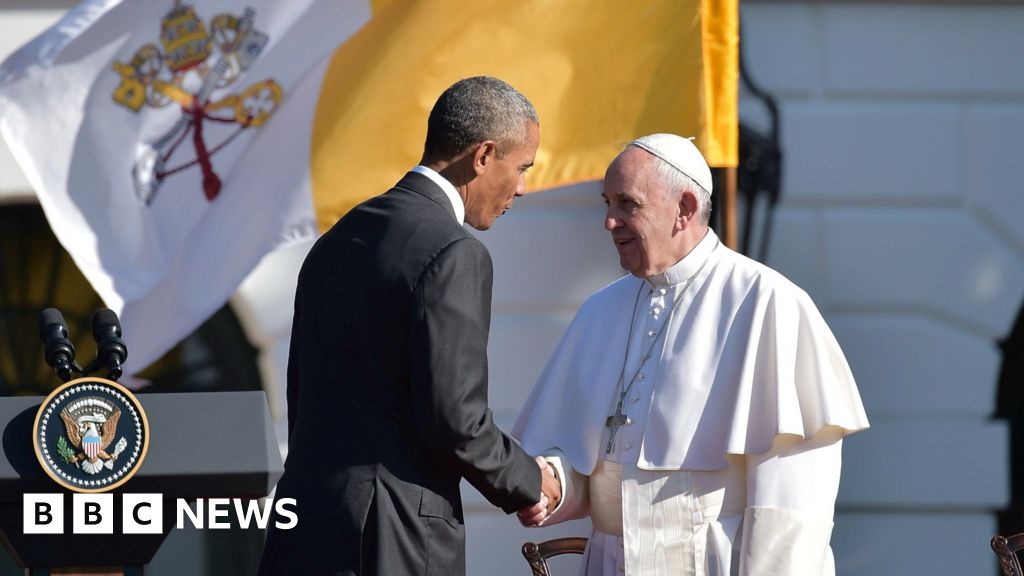ARTICLE AD BOX
 Image source, HeGetsUs.com
Image source, HeGetsUs.com
One of the adverts that ran during the game showed scenes of violence and disorder before the words 'Jesus loved the people we hate' popped up on the screen
Most Super Bowl adverts plug things like fizzy drink and cars, but one of the most talked-about commercials the day after the big game was selling Jesus - and it upset several very different political tribes.
Advertisements for an evangelical Christian website called He Gets Us have been shown on US TV since last year, during sporting events and the Grammys.
The ads use striking black-and-white photographs of recent events to project Christian values on to modern life.
They alternatively portray Jesus as a "cancelled" influencer, a refugee, a struggling worker and other archetypes.
And during the Super Bowl the commercial brought together opposite ends of the ideological spectrum - in outrage.
Alexandria Ocasio-Cortez, the left-wing Democratic congresswoman from New York City, tweeted: "Something tells me Jesus would *not* spend millions of dollars on Super Bowl ads to make fascism look benign."
Image source, Getty Images
Image caption,Alexandria Ocasio-Cortez tweeted her distaste at the campaign during the game
Meanwhile, Charlie Kirk, founder of the right-wing campus group Turning Point USA, said the adverts "pander to liberals". He's previously called the campaign "one of the worst services to Christianity in the modern era" and the people behind it "woke tricksters".
So who's behind the campaign and why did it attract such a wide range of detractors?
The people behind the campaign
The campaign is run by the Servant Foundation, a non-profit organisation based in Kansas, which is also known as The Signatry.
The website is coy about where funding comes from, noting that: "Most of the people driving He Gets Us, including our donors, choose to remain anonymous because the story isn't about them, and they don't want the credit."
However, David Green, the billionaire founder of arts and crafts chain store Hobby Lobby, confirmed in November that he was one of the main donors behind the campaign, which had an initial budget of around $100m.
Mr Green hews to conservative Christian values. In a landmark Supreme Court case in 2014, Hobby Lobby won the right to refuse on religious grounds to cover contraception and the morning-after pill as part of its employee health plan. A number of other controversies have seen the company accused of homophobia.
Jacobin, a socialist magazine, noted that the Servant Foundation has donated $50m to the Alliance Defending Freedom, an organisation that is designated as an anti-LGBT hate group by the Southern Poverty Law Center.
Who's upset by the ads?
The site says "we're not 'left' or 'right' or a political organization of any kind".
And while left-wing anger at the campaign online was focused on the people behind it - and its vast expense, money which some said would have been better spent elsewhere - criticism by conservative activists was triggered by the content of the advertisements themselves.
Many singled an advert which tells the story of Jesus's family while images of Latin American families fleeing towards the United States flash up on the screen. The commercial ends with the words: "Jesus was a refugee."
Some interpreted this and other adverts as pushing left-wing political views about immigration and diversity.
"Do you think open borders is biblical?" Mr Kirk asked before the game.
Image source, Getty Images
Image caption,Charlie Kirk leads a conservative campus activist group
The number of Americans identifying as Christian has steadily declined in recent decades.
In response to questions, He Gets Us didn't respond directly to the critics but instead pointed out that the campaign was successful in attracting attention, citing two marketing firms which rated the campaign as among the most-talked-about Super Bowl ads online.
Along with all the tweets, Google data showed a big spike in searches for the campaign during the game.
"The goal is that the two commercials will not only inspire those who may be sceptical of Christianity to ask questions and learn more about Jesus, but also encourage Christians to live out their faith even better and exhibit the same confounding love and forgiveness Jesus modelled," said He Gets Us spokesman Jason Vanderground.

 2 years ago
44
2 years ago
44








 English (US) ·
English (US) ·